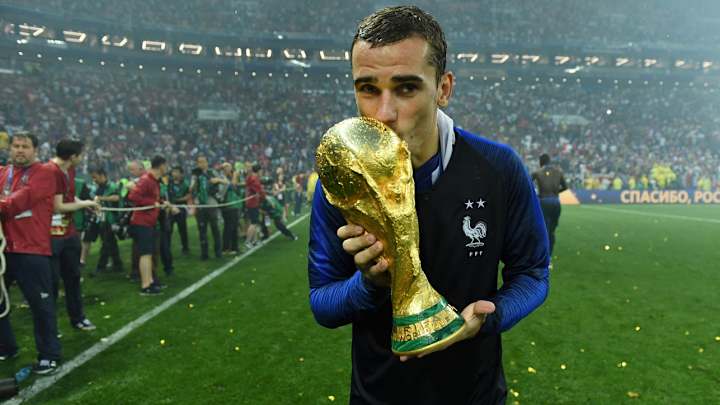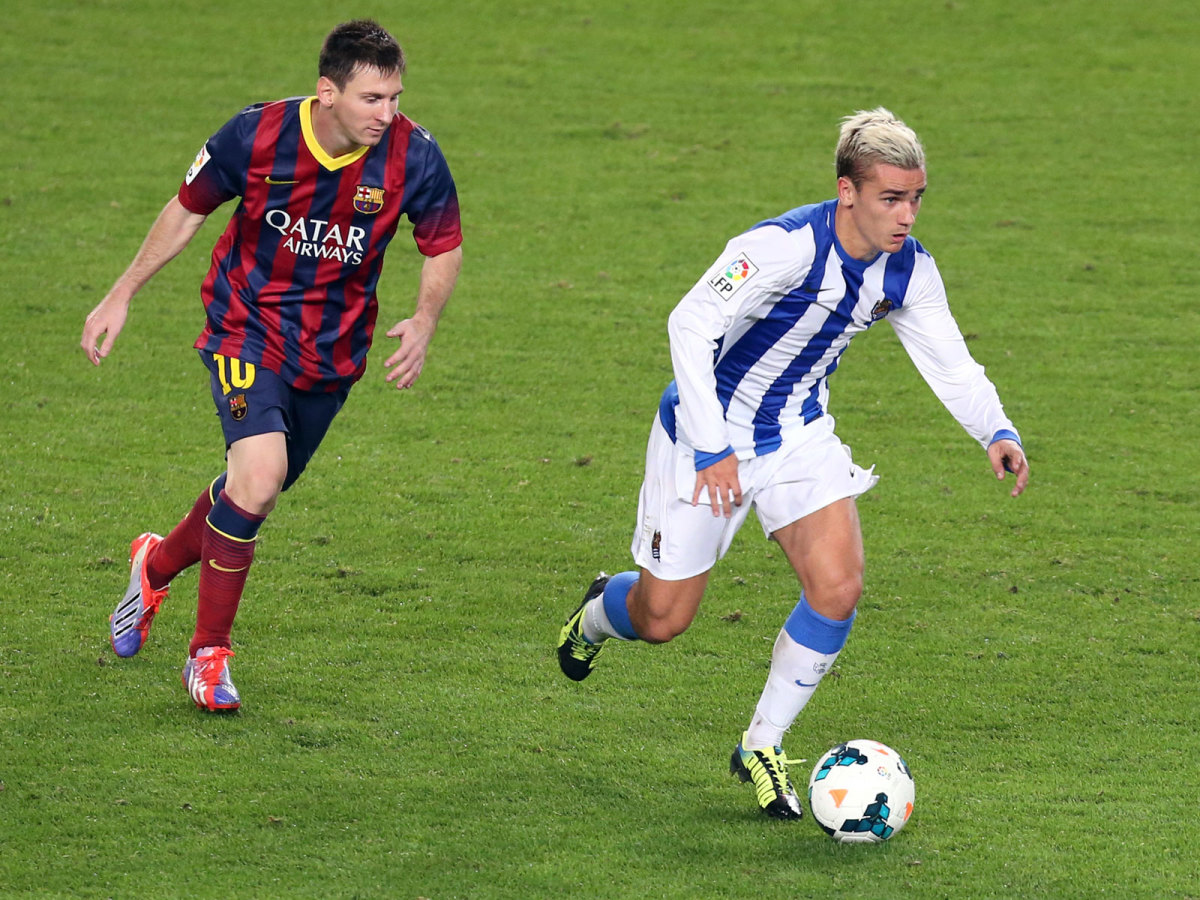Griezmann's Career, Triumphs, Humble Beginnings Chronicled in New Netflix Doc

There’s a scene near the end of Antoine Griezmann: The Making of a Legend when the French star, while reflecting on his first-half penalty at the 2018 World Cup final against Croatia, describes what his mind was going through as he stepped to take it.
At that point in the game, the score was 1-1, and for millions of French supporters and others watching, it was an anxious, nail-biting moment. If he scores the penalty, France retakes the lead just before the break, but if he misses (as he did in the 2016 Champions League final against Real Madrid) the momentum shifts in the opponent’s favor.
But Griezmann knew the outcome already.
"I took the ball and I thought, ‘It’s in the bag.'"
Griezmann pauses, stares at the camera and says with a smile, "Easy, right?"
By the final whistle, France was crowned champion with a 4-2 victory and Grizou, as he is lovingly called by his teammates, earned Man of the Match honors. As he reflects once again, Griezmann now tries to describe what he was feeling when he lifted the trophy. Unlike the penalty anecdote, however, he is not as funny.
“I thought of my parents,” he pauses, and then begins to cry. “My parents who let me go [leave France] at such a young age. The coaches, or parents of my teammates when I was 14 and told my dad they were so mad he could let me go so far away.”
Brushing his tears away, the 28-year-old talks about his mother, his siblings and how winning the World Cup was the reward after years of not being with them: “My brother and sister, I rarely see them so [winning the World Cup] was like, ‘Hell, we made it.’”
These two scenes are a good way to describe Griezmann’s charismatic albeit sensitive personality through this documentary. It is the latest installment from Netflix as the streaming service expands its soccer portfolio, which includes docu-shows such as Sunderland Till I Die, First Team: Juventusand Boca Juniors Confidential.
This, however, is not an episodic series but rather a one-hour film chronicling Griezmann’s rise. It does so by cleverly telling two stories: the trajectory of his career and his role as part of France’s journey at the World Cup.
Le documentaire « Antoine Griezmann : Champion du monde » maintenant disponible sur Netflix. ⭐⭐ pic.twitter.com/t4hhHrSuNP
— Antoine Griezmann (@AntoGriezmann) March 21, 2019
First off, it’s important the criticize the first obvious mistake from the filmmakers, which is to include the word Legend in the title. Yes, Griezmann has won the World Cup and Europa League, and through individual accolades he has achieved global recognition as one of the best players in the world; however, Legend is a delicate, precious word unfortunately thrown around these days like confetti. In this particular setting it’s highly presumptuous to use it, and when even the great Lionel Messi shies away from that status, you have to be very careful when you claim it as your own.
A more appropriate word for the film is Underdog, as the film shapes Griezmann’s story as an inspiring tale, in which, due to his size and lack of physicality, his road to stardom was long and arduous.
The film does not use a narrator, instead opting for interviews from those who know him best. Through France manager Didier Deschamps and Atletico Madrid teammate Diego Godin, we learn of Griezmann’s personality, his work ethic and what he had to go through in order to become a professional. It all began in his hometown of Macon, a four-hour drive from Paris.
Any youth player who’s been rejected over and over again could probably relate to this documentary.
It starts with his father, Alain, describes to the viewer the thousands of miles he drove across France with his son for tryouts and tournaments, only to receive rejection after rejection.
“It was very difficult for Antoine, a little short-ass who wasn’t very fast,” Alain says. “You can’t say that a child’s going to be a pro, but all the pro clubs he tried, he got rejected. Always happy going out [to tryouts] ... sad coming back.”
It wasn’t until a tournament a 14-year-old Griezmann played in 2005 and on trial for Montpellier that scout Eric Olhats wound becoming the most important person in his career.
During the tournament, Olhats noticed there was something special about this blonde, skinny kid and gave his father his card. Knowing too well the reality of rejection and how much it affected his son when things didn’t work out, Griezmann’s father didn’t call for weeks. Olhats left messages, but none were returned. But young Antoine was persistent and pushed his father for just one more opportunity. If he fails this time, then so be it, but Griezmann wanted one more shot at it, so his father caved.
After impressing, Griezmann eventually moved to Real Sociedad’s academy, and that’s where, slowly, the player we've all come to know started his trajectory. At Sociedad, much like throughout all of Spain, size is second to technique, so Griezmann became a better player, and thanks to Olhats, he battled homesickness and became more confident in his game.
Griezmann, the French champion, was actually made in Spain.

Once he moved to Atletico Madrid, Diego Simeone’s intense approach made an immediate impact on the player, thus turning Griezmann into not just a playmaker but also an aggressive, versatile goal scorer.
“I remember a session where I received a ball and instead of shooting, I passed. He stopped the training session and blew the whistle,” says Griezmann, who recalls getting a first taste of Simeone’s lectures. “If he only speaks to you, it isn’t good. He said, ‘There are no passes here. You’ve got to score, to strike. Football is about winning and winning means goals.' He shouted at me but it taught me a lesson. I went home and a bit angry and down.”
Eventually, Simeone realized that if he was to get the best out of him, he had to move Griezmann more centrally as opposed to being out wide, and that changed everything.
“El Cholo and my club teammates gave me, let’s say, my love of making an effort for the others, even the goalie,” says Griezmann. “If there’s a pass back to the keeper, I love going for it.”
Godin, one of his best friends and the godfather to his daughter, also explains the Frenchman’s love for Uruguay, for maté and garra charrua.
“He likes our way of life, our culture, how we speak, how we are,” says Godin, who also remembers how, because of this respect, Griezmann didn’t celebrate his goal against the South Americans during their World Cup quarterfinal. “People didn’t understand [why he didn’t celebrate], but he said it was out of respect for the Uruguayans. The president even officially invited him to Uruguay.”
The film also touches on the 2012 controversy with the U-20 national team, when he was suspended for one year after late-night drinking with four other players, but it was a creative failure to not also include the other notable controversy from 2017 when he shared a photo of himself in blackface as a Harlem Globetrotter. Griezmann did semi-apologize through a tweet, but a longer explanation in this documentary would have gone a long way.
Another part of his career that is not included is the bizarre non-decision decision where Griezmann announced his plans to stay with Atletico Madrid on Spanish television, days before France’s opener at the World Cup. Given his love for the NBA, it was a clear attempt to mimic LeBron James’s scrutinized announcement from 2010 but again, a quick scene where the player explains why he made that call would have been smart.
We live at a time when, thanks to social media, platforms such as The Players Tribune and shows like HBO’s The Shop, access is no longer an obstacle and instead what the audience craves for is raw humanity from the athlete. This documentary makes it halfway.
Regardless, Antoine Griezmann: The Making of a Legend achieves its goal, which is to visually tell Griezmann’s story: the struggles, the fortunes and his close bond with his family, all while celebrating his popularity as a soccer star and a public figure. Griezmann is Ocean’s Eleven’s Danny Ocean–a personable leader, respected and appreciated by his peers who faces adversity with charisma.
But above all else, through the main character, this documentary tells you that through hard work and dedication, success is possible, even to a skinny, blonde underdog.
